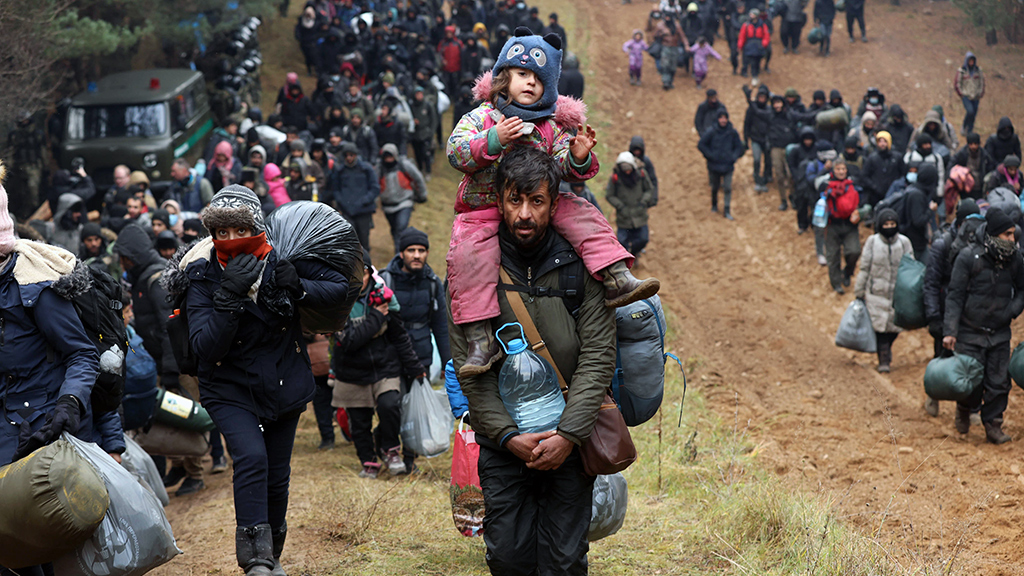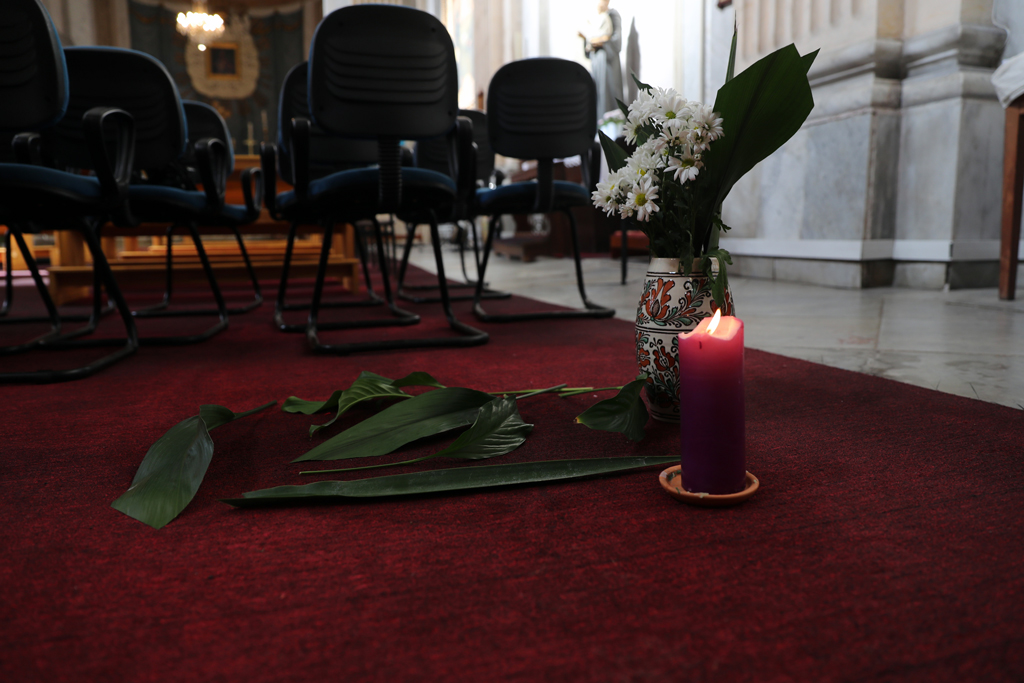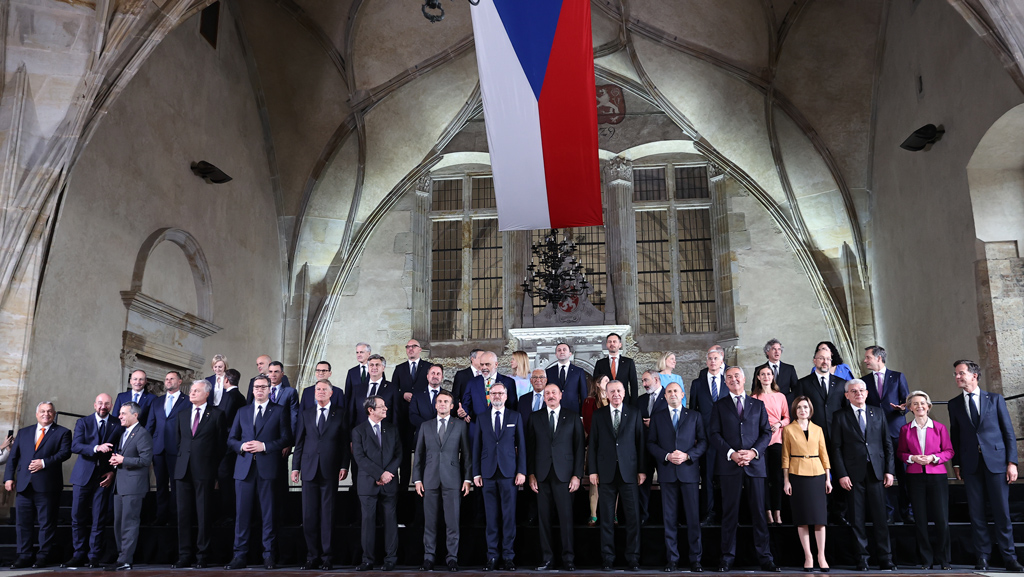Various developments in Europe’s eastern front have started to attract the attention of many. Starting with the migrant crises on the border between Poland and Belarus and the gathering of military forces at the Russia-Ukraine border to the joint military exercises in the Baltic region and the growth of interethnic tensions in Bosnia-Herzegovina – all of these bring to the fore the fact that the struggle for spheres of influence is gaining momentum once again in Europe.
For a better understanding of the situation, experts have analyzed Russia’s latest foreign policies, the migration crisis on the Poland-Belarus border as well as the implications of these events for Turkey, the West and the international system in general. Prepared by Gloria Shkurti Özdemir Experts Yaşar Sarı Oktay F. Tanrısever Vişne Korkmaz Magdalena Kumelska-Koniecko Muhammed Koçak Yaşar Sarı
Haydar Aliyev Eurasia Studies Research and Application Center, Ibn Haldun University and International Relations, Bolu Abant Izzet Baysal University
Yaşar Sarı
Haydar Aliyev Eurasia Studies Research and Application Center, Ibn Haldun University and International Relations, Bolu Abant Izzet Baysal University
Considering Russia’s latest moves on its western front, how might they affect the international system, NATO and the U.S.? What is Russia aiming for with these developments?
Russia's recent moves should be assessed by considering several developments. The U.S.' build-up in the region (particularly in Alexandroupolis in Greece), the frequent visits of the U.S. and other Western warships to the Black Sea, the closure of Russia's representative office in NATO’s headquarters in Brussels, the expected new government led by Social Democrats formed in Germany and the supply shortage in natural gas are some of these developments. Moreover, the parliamentary election in Germany, France distancing itself from U.S.-led NATO and Turkey's recent troubles with its Western allies provide unmissable opportunities Russia hopes to utilize and make diplomatic maneuvers. So, Russia gets on Western countries' nerves both militarily (through military drills and build-up) and politically (as in the immigration issue and making statements supporting the separatists in Bosnia). It can be clearly understood that Russia has four main objectives: to reduce the increasing U.S. pressure; to get rid of the embargoes imposed by the Western states (especially the European Union members); to have the international community accept Russia's geopolitical gains – especially the annexation of Crimea, at least a de facto level, even if not officially; and finally, to widen the cracks in the Western alliance by taking advantage of the differences in the policies of the leading states in the Western bloc (the U.S., Germany, France and to a lesser extent, Turkey) toward Russia. Russia has been pressured to take tactical back steps following the elimination of the disparity in rhetoric and policy between the president of the United States and the establishment (disparity existed during Donald Trump's term). After Joe Biden became president, the disparity disappeared, and the U.S. has pushed its allies to act together to deal with Russia. Finally, it is also known that the decision-makers in Russia (which has a ruling elite dominated by people who worked in security units, such as Putin) are quick to take advantage of strategic opportunities. Russia's success in the annexation of Crimea reflects this. We should also consider that Russia has an authoritarian regime, albeit a soft one, which speeds up the decision-making processes. For this reason, Russia will manipulate, test and take advantage of the deepening disagreements among Western countries on policies toward Moscow. It will look for possible opportunities to establish a better relationship with the coalition government, led by the Social Democrats, which will be established in Germany (mirroring in the relationship between Social Democratic Prime Minister Gerhard Schroeder and Vladimir Putin). Back to top Oktay F. Tanrısever
Department of International Relations, METU
Oktay F. Tanrısever
Department of International Relations, METU
What are the possible implications of recent Russia-West tensions for Turkey?
The fact that Russia-Western relations are becoming tenser in a region that stretches from the Baltic Sea to the Black Sea, which is very close to Turkey, poses risks for Ankara in general. It should be expected that this tension, which has emerged between actors that have important relations with Ankara, will have serious direct and indirect impacts on Turkey. First of all, since Turkey maintains a principled position on the territorial integrity of Ukraine, Ankara does not recognize the annexation of Crimea and is against Russia’s military threat to Ukraine's territorial integrity. It was also not surprising that Ukraine showed interest in the purchase of new Bayraktar TB-2 unmanned aerial vehicles (UAV) from Turkey during this period. It will also not be surprising that Russia will react as it did amid the previous sales process. In this context, Ankara is also expected to emphasize that the deepening defense cooperation between Turkey and Ukraine is not a stance against any third countries, including Russia. While Turkey is expected to maintain its stance against Russia's military build-up against Ukraine and the increase in its military activities – which could turn the current balances in the Black Sea region in its favor – the steps that Ankara will take to keep the diplomatic channels open between the parties may be welcomed by all parties, including Russia. The fact that some Polish and Western circles claim that Turkish-flagged planes played a role in bringing migrants to Belarus during the migrant crisis in Belarus shows that Ankara must closely follow the development of this crisis. It would be an effective step for Ankara to convincingly explain to the relevant parties that these claims aiming to involve Turkey in this crisis are invalid, using both diplomacy and public diplomatic channels. Likewise, Turkish-flagged airline companies' decision to temporarily not sell tickets to or accept passengers in transit to Belarus from Middle Eastern countries, where the risk of irregular migrants is high, may also undermine their efforts to draw Turkey into this crisis. As a result, it seems that it would be both necessary and beneficial for Turkey to play an active role in reducing the tensions in Russian-Western relations. It could do this by using crisis management tools and with initiatives made through diplomatic channels while maintaining its foreign policy priorities in these crises that have emerged between the Baltic Sea and the Black Sea. Back to top Vişne Korkmaz
Nişantaşı Üniversitesi
Vişne Korkmaz
Nişantaşı Üniversitesi
How do you assess the latest developments in Belarus and what could be Russia’s role in the migrant border crisis?
The refugee crisis on the Belarus-Polish border has once again exposed the different weaknesses of the EU and Europe. In this respect, it is quite ironic that the crisis emerged on the days when the EU is discussing the Strategic Compass. As it is known, Belarus, Ukraine and Moldova (perhaps Georgia and Azerbaijan can be added to this list) are in a gray area where Russia and the West’s strategic spheres of influence overlap. Therefore, they were exposed to encouragement, especially from the EU. This encouragement also made it difficult for the countries to pursue balanced diplomacy between Russia and the West. Belarus is a country that has disrupted its balanced policy in the face of the inertia of the West and the preparations of Russia by standing close to Moscow. As a result, Lukashenko gets a chance to strengthen his regime. The pressure exerted by the EU on Belarus through the political process and crises paves the way for EU sanctions. Here, we see the use of sanctions as a means of punishment – damaging Minsk's already fragile economy. As a result, with the refugee crisis, Minsk also shows that it has some tools of its own, pushing the EU to consider changing its penal policy toward Belarus. However, this crisis is not just an EU-Belarusian issue. It is a two-fold hybrid crisis. On one hand, it is hybrid because refugees are being used as a threat to border security and through that threat, it is hoped political concessions will be made. On the other hand, it is hybrid again because the Kremlin provides Minsk a deterrent through its support, including the deployment of Russian warplanes and air defense systems in Belarus, which protect against the possibility of military pressure against Belarus. In other words, it turns the crisis into a tool through which Russia lays down its hand. Therefore, while it shows the West that without an agreement with Minsk and Moscow, the refugee crisis will remain an ongoing problem, it also shows that the Russian deterrent against the Western threat is valid. Moreover, it also shows that the questioning and testing of Russia's actions in Ukraine and the Black Sea has a price. Through the example of the fear Europe is facing, it also sends a message to the U.S. to abandon the Black Sea without escalating tensions as such moves may cause the destabilization of Europe. Back to top Magdalena Kumelska-Koniecko
University of Warmia and Mazury in Olsztyn
Magdalena Kumelska-Koniecko
University of Warmia and Mazury in Olsztyn
What are the Polish and Russian perspectives on the migrant border crisis?
The escalation of tensions on the Polish-Belarusian border (the external border of the European Union) is a direct result of the actions of Alexander Lukashenka, which fit the definition of a hybrid war. The reason why the Belarusian regime used Middle East migrants to destabilize Poland, Lithuania, Latvia, and thus the entire European Community, was the implementation of sectoral sanctions on Belarus (petrochemical, tobacco, fertilizer industries) in response to the rigged presidential elections and subsequent repressions against the opposition and Belarusian citizens. Alexander Lukashenka, provoking the migration crisis, counted on the lifting of the sanctions imposed by the European Community, without fulfilling the precondition of releasing political prisoners, including Polish journalist Andrzej Poczobut and Polish activist in Belarus Andżelika Borys. Brussels not only stood firm but on November 15, 2021, it approved further sanction criteria under which the so-called "back list" (ban on leaving the territory of the EU and freezing financial assets) including people, companies and institutions associated with the Lukashenka regime will be extended. If we assume that the plan to destabilize the European Union by using human tragedies was written in Moscow, it can be concluded that Russia's short-term goal is to ridicule the European Community by abusing the values on which it is based (a tactic already being implemented by Russian and Belarusian propaganda); in the medium term, undermining the cohesion of the European Union by using the contradictions in the perception of the migration crisis and testing the solidarity of the signatories of the North Atlantic Treaty; in the longer term, permit Russia's military presence in Belarus, obviously to “protect it,” which would be the worst-case scenario for Poland. It would also be particularly dangerous for Ukraine, which in this situation, would find itself in the so-called “Russian claws.” Although Moscow strongly denies the accusations of involvement in the crisis, it would be naive to believe in the promissory of Kremlin authorities, given their close relations with Minsk. Vladimir Putin, on the one hand, can use the migration crisis to strengthen Russia's image as a mature and responsible power, which can take on the responsibility of mediating between Minsk and Brussels; on the other hand, the concentration of the international community on the Polish-Belarusian border has created a space for the mobilization of the Russian military forces on the eastern border of Ukraine, which raises legitimate concerns, not only in Kyiv. Back to top Muhammed Koçak
Florida International University
Muhammed Koçak
Florida International University














